Our view at Stack - Simplify growth with an all-in-one platform. Powerful marketing, sales, and support automation. Integrated CMS. Scalable software. Crafted for customer experience.
Thousands of other job seekers are applying for your dream job. So, if you want to get hired, you must learn how to start a cover letter that makes you stand out from the crowd.
As someone who’s written several cover letters — including the one that landed me my dream job at HubSpot — I’ve found that a compelling cover letter introduction makes the hiring team excited to know more about you. That’s something a resume alone won’t do for you.
Today, I’ll show you how to start a cover letter that hooks employers at first glance.
![→ Click here to access 5 free cover letter templates [Free Download]](https://no-cache.hubspot.com/cta/default/53/3f347702-d7e9-4e59-9fe4-be4cd7bad191.png)
Table of Contents
- Cover Letter Opening Lines
- How to Start a Cover Letter for a Job
- Contact Information Checklist for a Cover Letter
Cover Letter Opening Lines
I took some time to study the best cover letter examples, and one thing stood out to me: They all have compelling opening sentences.
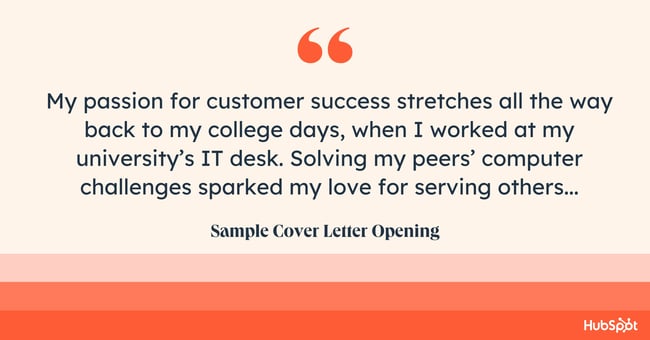
To help you overcome writer’s block, I’ve put together some crisp cover letter opening lines so you can get your creative juices flowing.
- It’s uncanny how much the job posting describes me.
- Since [moment you were inspired], I have wanted to work in [company name].
- In [year], I generated [ballpark figure] in revenue, [figure] leads, and nearly tripled content marketing ROI for my previous employer.
- I knew I had to apply when I realized [company name] was hiring.
- I’m passionate about [industry]. That’s why I was thrilled to learn of [company name]’s incredible breakthrough on [breakthrough details].
- It’s likely that you don’t know me, but your client services team certainly does. Now, I’d like to join the vendor that made me a successful [type of profession].
- With my strong oral communication skills, I can effectively engage with clients to understand their needs and provide tailored solutions, ultimately driving customer satisfaction and retention for your company.
- I know you’re my current employer’s competitor. But why can’t we be friends?
- My role as a [current position] has given me a ton of experience in [relevant skill]. Accordingly, I’ve learned that the best way to achieve success is through [important lesson you learned].
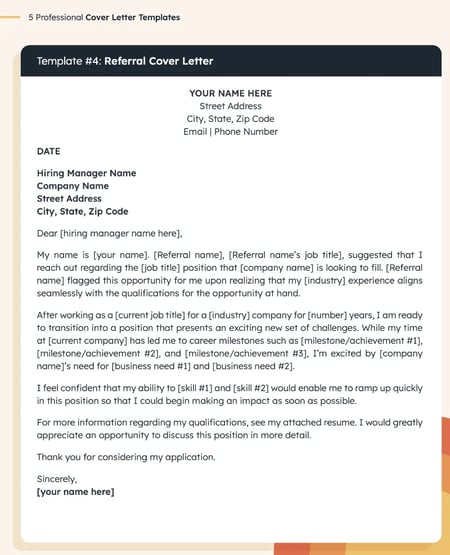
Featured resource: 5 Free Cover Letter Templates
Start off your cover letter (and finish it) with a bang with 5 Free Cover Letter Templates. These fill-in-the-blank templates can help you impress recruiters and land your next job interview.
The Dos of Starting a Cover Letter
I used to think my writing was the secret sauce that made my cover letters stand out. But over time, I realized there were other elements that really brought them to life.
Based on my experience, here are some things I recommend doing:
- Indicate interest in the company. It’s obvious you’re interested in the job. But how interested are you in the company? I always go the extra mile by explaining why I’m drawn to the company — more on this later.
- Stand out from the crowd. Show the hiring team what makes you better than other applicants. Here’s where I highlight my skills, passion, and accomplishments.
- Dig into the company. Once you understand the company culture, goals, and values, you’ll know how to adjust your tone accordingly.
- Keep your sentences short. I get it — you have a lot to write about yourself. Aim for the least amount of words, though. Three to four paragraphs is the magic number. Always works for me!
- Address the hiring manager by name. Here’s your chance to cut through the “dear sir/ma’am” clutter in your salutation. LinkedIn and company websites always come in handy when I want to get a hiring manager’s name without contacting the company directly.
The Don’ts of Starting a Cover Letter
When writing a cover letter, here are some things to avoid if you want to land a job interview faster:
- Avoid information dumps. I know you’re proud of your skills and accomplishments, and you should be. But instead of overwhelming the hiring manager with loads of information, highlight the value you bring to the company.
- Don’t sound arrogant. There’s a thin line between confidence and arrogance. So, instead of making bold claims about your qualifications, quantify your accomplishments and present yourself as an enthusiastic team player.
- Don’t highlight your weaknesses. Instead of apologizing for a lack of specific qualifications, focus on your strengths and show how you’ll provide value to the company.
- Don’t forget to proofread. If your cover letter needs a second pair of eyes, go for it. Typos and grammatical errors can portray incompetence, so normalize asking your friends and family for help.
- Don’t copy and paste your resume. You shouldn’t list all your hard skills and experience in a cover letter — that’s what your resume is for. Instead, present unique selling points you wouldn’t include in your resume.
- Don’t be cliché. Avoiding clichés involves describing what makes you unique. For example, instead of writing, “I have excellent oral skills,” explain how you’ve used those skills to accomplish something in a previous role. For instance, “My excellent oral skills and unique storytelling abilities helped me close 40% more deals and bag the Salesperson of the Year Award in my previous role.”

A cover letter is a lot like a professional bio — it highlights your expertise and accomplishments. The difference is that while a bio is static, a cover letter is tailored to a specific role, which means you’ll need to impress the hiring manager from the get-go.
When starting a cover letter for a job, here are ten methods I recommend.
1. Share a quantifiable accomplishment.
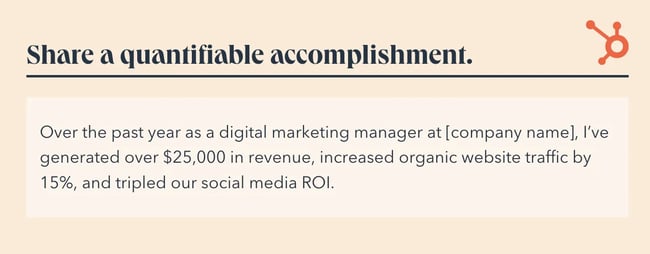
It isn’t enough to mention you’re a “digital marketer with proven success in SEO strategies.” Proven success? Okay, where’s the proof?
Don’t expect the hiring manager to just take your word for it. Toss in some stats instead. How have you contributed to your company’s bottom line? Did your Facebook marketing campaign grow your social media following, or has your blog content increased organic traffic?
Unsurprisingly, while researching this topic, I found that I’m not the only one who believes in starting a cover letter with a quantifiable accomplishment.
Corissa Peterson, a certified resume writer at Resume Genius says, “When a candidate quantifies their accomplishments, it tells me that they get the importance of results and business impact. In our business, it’s all about the results.”
Sure, past success doesn’t guarantee future results, but employers love seeing numbers anyway — stats mean measurable performance.
Example
“Over the past year as a digital marketing manager at [company name], I’ve generated over $25,000 in revenue, increased organic website traffic by 15%, and tripled our social media ROI.”
Why This Works
Employers want to see whether you’re capable of achieving long-term results. By including stats, this candidate goes straight to the point and gives employers just what they’re looking for.
Pro tip: Not all achievements are quantifiable. If you don’t have the work experience to report impressive numbers, I recommend a qualitative approach. Ever received positive feedback from your boss? That counts!
2. Start with something they don’t know.
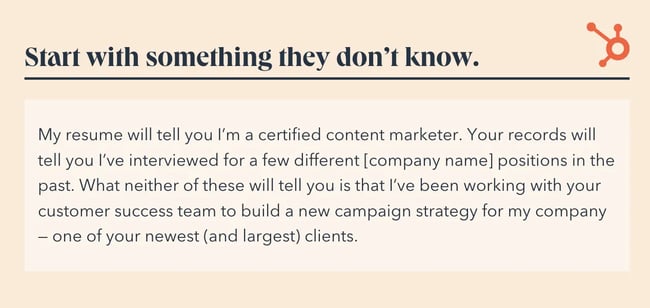
Hiring managers are busy people. So, I wouldn’t waste their time when applying for a job. That’s why I never state the obvious. They already know I’m writing to apply for the open position at their company, and my resume highlights everything they need to know about my job history and educational background. Why waste my opener on something so boring?
In my years of experience, I’ve learned it’s an instant rejection. So, I start my cover letters by offering something new, expanding on what the employer already knows about me, and presenting new details about what I can bring to the company.
Example
“My resume will tell you I’m a certified content marketer. Your records will tell you I’ve interviewed for a few different [company name] positions in the past. What neither of these will tell you is that I’ve been working with your customer success team to build a new campaign strategy for my company — one of your newest (and largest) clients.”
Why This Works
The candidate steals the show with a unique intro that demonstrates they’re not interested in wasting anyone’s time. Not even theirs. This impressive tactic effuses the kind of confidence that makes other cover letters pale in contrast to yours.
3. Start with facts or news about the company.

You can’t go wrong with company news and facts in your first sentence. These little add-ons show you’ve done your research about the company.
I love including company news in my cover letters because it allows me to incorporate my own values. For example, if a company I’m interested in wins an award for its high-tech solutions, I can sprinkle in a few words about how much I value technological advancements.
Besides facts and news, here are other things worth including in your opening sentence:
- Recently released studies, surveys, or reports.
- Prevailing challenges in the company.
- Technologies the company is currently using.
Let’s see how to start a cover letter by mentioning a newsworthy event.
Example
“When I saw that [company name] was featured in Fortune Magazine last month for its commitment to renewable energy and reducing waste in the workplace — all while experiencing triple-digit revenue growth — I was inspired.”
Why This Works
Not many job applicants will even think of including newsworthy events in their cover letters, so this candidate is off to a great start by mentioning the company’s most recent wins.
4. Mention a mutual connection.

If an internal employee suggested you apply for a role at their company, don’t be shy to include this in your cover letter opening line. However, you’ll need to get their permission first. I find this helpful because it lets me build a sense of familiarity with the hiring manager.
According to Gitnux Marketdata Report 2024, 70% of employers share my sentiments; they believe referred employees fit better with their company culture.
That being said, be tactful with your approach. When mentioning a mutual contact, I always make sure it’s more than just a name drop but something that adds value to my cover letter.
For instance, I provide context by highlighting how my relationship with the person has prepared me for the role. And if there are any shared values that make me an ideal candidate, I mention them as well.
According to Jess Munday, the people and culture manager of Custom Neon, “the risks of mentioning someone include the possibility that the connection might not have a positive relationship with the hiring manager or may not endorse the candidate as strongly as assumed.”
To mitigate these risks, Jess suggests confirming the connection has a good professional relationship with the hiring manager.
Example
“At the suggestion of my former colleague, [colleague’s name], I’m submitting my resume for the graphic designer position and [company name]. I worked with [colleague’s name] at [previous company name]. She referred me to this job because she believes my proficiency in Adobe Photoshop and Illustrator makes me a great fit for the role.”
Why This Works
There was no beating around the bush here. The applicant seized the first opportunity to hook the hiring manager’s attention by mentioning a mutual contact. It’ll get them wondering how much of an asset the person is. That’s the kind of curiosity that gets you hired.
5. Share a lesson you’ve learned in your career.

Learned something noteworthy in your previous job? Let’s hear it. Employers expect some level of expertise from their employees. Well, unless you’re applying for an entry-level job.
If you want to impress employers, spice up your cover letter opening line with a lesson you’ve learned in your career. Let’s see an example of this tip in action.
Example
“As a [previous job position] with high-level management experience in the [industry], I’ve learned that the best way to boost conversions was to [biggest lesson you’ve learned].”
Why This Works
Notice how this candidate demonstrates their ability to learn and adapt? They sure are committed to professional development. That’s a surefire way to stand out from the rest!
6. Start with your mission statement.

I’m a big advocate of applying for a role that aligns with my values. So, I wouldn’t want to work in an organization whose vision and mission I don’t share. Our goals must align to a great extent. It helps me strike a healthy work-life balance that contributes to my overall job satisfaction.
If you don’t already have a personal mission statement, you might want to take some time to create one. I’d recommend checking out personal brand statement examples or LinkedIn profiles of industry leaders for inspiration.
Bryan J. Driscoll, owner of Bryan J. Driscoll, JD, LLC, says, “Opening with a personal mission statement […] isn’t about grandiose declarations of intent but about succinctly aligning one’s professional purpose with the organizational mission.”
Bryan further provides an example of how to start a cover letter using a personal mission statement.
Example
“Driven by a commitment to foster inclusive work environments, I’ve dedicated my career to developing HR policies that not only comply with legislation but celebrate diversity — reflecting the company’s core values.”
Why This Works
The candidate doesn’t stop at mentioning what motivates them. They take things one step further by linking their motivation to the company’s core values. They’re essentially telling the hiring manager, “I know the importance of this role, so I won’t slack off on it.”
7. Express passion for what you do.

When researching this article, I was surprised to find that companies spend almost $4,700 to recruit new talent. So, I don’t blame recruiters for using strict screening methods to choose the right candidate for each role. And part of what makes you suitable is your passion.
Passionate employees are more likely to be content with their jobs and stay longer in their positions than discontent employees. In my case, I’ve been a seasoned writer at HubSpot for over six years, and my passion for storytelling is one of the things that keeps me going.
So, if I want to express passion for what I do, I’ll include at least one of these things in my cover letter:
- What inspires me.
- What I enjoy doing.
- My career goals.
Then, I’ll link my passion to the role I’m applying for. The example below demonstrates how to achieve this.
Example
“My proficiency in using design tools like Adobe Photoshop aside, what truly drives me is the power of telling stories through compelling visuals. I enjoy consuming complex information, breaking it down, and presenting it in a simple-to-understand, colorful visual that resonates with my target audience.”
Why This Works
Every job applicant will boast about their skills. Only a few, like this one, will truly express genuine passion for what they do. It’s a breath of fresh air that hiring managers will really appreciate.
8. State your unique value proposition.
Because hiring managers receive hundreds of job applications, they may spend less than 30 seconds reading each cover letter to find out how each candidate can provide value to the company. Why not make their job easier by writing your unique value proposition upfront?
It’s not enough to just state your hard skills. Instead, highlight how your skills, accomplishments, and experience make you a valuable asset to the organization.
George Moulos, managing director of Ecommerce Brokers, shares this sentiment. He says, “Simply listing skills in a cover letter can come across as generic and impersonal. Effectively highlighting skills involves connecting them to the specific needs and goals of the company.”
In the example below, George demonstrates how to start a cover letter by highlighting what you bring to the table.
Example
“With my strong communication skills, I can effectively engage with clients to understand their needs and provide personalized solutions, ultimately driving customer satisfaction and retention for your company.”
Why This Works
I love how concise this intro is! Plus, the candidate shows they understand the requirements of the customer-facing role they’re applying for. Looks like a win to me.
9. Start with excitement for the company.
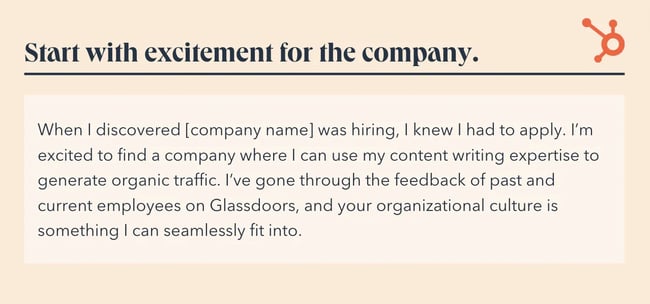
It makes sense to mention why you’re interested in the role you’re applying for. But to hiring managers, that’s just another bland section of a cover letter. Tell them why you’re excited to work for the company, and you’ll totally blow them away.
For instance, if I’m applying for a content writing role, I could say, “I’m excited to work at [company name] because I’m passionate about content writing, and I think my skills and experiences will be a good match.”
Sure, I’ve expressed my passion for the job, but I’ve done nothing to explain why the company specifically suits my interests. So, instead, I’ll want to highlight how my expertise relates to the company’s goals.
Example
“When I discovered [company name] was hiring, I knew I had to apply. I’m excited to find a company where I can use my content writing expertise to generate organic traffic. I’ve gone through the feedback of past and current employees on Glassdoors, and your organizational culture is something I can seamlessly fit into.”
Why This Works
Employers want to hire people who are excited about working for them. I like how the candidate shows they appreciate the organizational culture, proving that it’s not just about the money — they’re genuinely interested in the company.
10. Start with an element of surprise.

Imagine if you had to flip through a hundred cover letters a day, and each one began with the same cliché phrase: “I’m writing to express interest in…”
Boring, right? It’ll be easy for such applications to get lost in the clutter. That’s exactly what you don’t want to happen in your job search.
Hiring teams need a break from cliché cover letter opening lines. So, you’ll be at an advantage if you quickly build intrigue from the first line. It spurs them to keep reading.
One thing I’ve learned, though, is that if you start your cover letter with an element of surprise, you need to follow it up with some concrete information.
Example
“I like to think of myself as a round peg thriving in a square hole kind of world. What does this mean? It means that my diverse background makes me a well-rounded candidate who is able to comprehend, develop, and execute various functions in business.”
Why This Works
Finally, a cover letter where the job applicant’s personality shines through! That’s something you don’t see every day. When hiring managers feel like a real person is behind a job application, they’ll want to keep reading.
Contact Information Checklist for a Cover Letter
In some cases, you’ll submit your cover letter separately from your resume. So, you need to make sure the hiring manager can reach you if the need arises. That’s why I always double-check to confirm I’ve included my contact information and everything else that belongs in the header.
Here’s a checklist I swear by:
- Your full name.
- Your phone number.
- Your email address.
- Your location.
- Name of the recipient.
- Job title of the recipient.
- Company name.
- Company address.
After you’ve written a good cover letter, though, your resume can determine whether or not you make it to an interview. So, learning how to write a resume is just as important as polishing your cover letter writing skills.
If you want to boost your chances of getting your dream job, I’d recommend following our ultimate resume-writing checklist, straight from recruiters.
Crafting a Compelling Cover Letter
When making a career change, learning how to start a cover letter is a soft skill worth gaining. It can significantly boost your job search and help you land multiple interviews.
If you want to craft a great cover letter in half the time it’ll take to write one from scratch, the cover letter formats I provided earlier are all you need. Whether you want to write a skimmable cover letter or a data-driven one, you’ll find unique formats you can customize to get your dream job.
Remember the dos and don’ts I outlined? They’ll come in handy whether you write a cover letter from scratch or use a template. While there’s no hard and fast rule, following these tips will help your job application stand out from the rest.

![]()
If Hubspot is of interest and you'd like more information, please do make contact or take a look in more detail here.
Credit: Original article published here.
